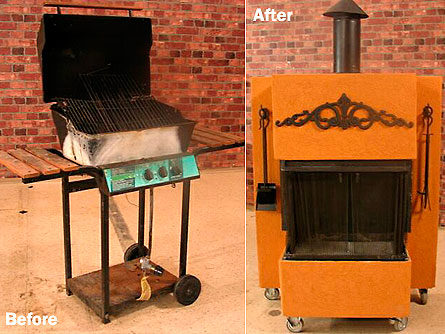Obama Could Learn from ‘Junk Bros.’
In recent weeks, Barack Obama has begun naming people to serve in his Cabinet and close circle of White House advisors. Political analysts and bloggers have complained that the people being tapped for these posts are not newbies to government, just recycled politicos from past administrations — mainly Bill Clinton’s. In other words, there’s little of the dramatic “change” that the President-elect had promised during his campaigning.

To me, the paucity of change runs far deeper than a lack of new faces. It’s structural. And the solution: It might just require recycling on a whole new and bigger scale.
The United States is in the throes of a devastating economic crisis. Yet even before our year-long recession was in full force, the nation was having trouble coping with a host of seemingly intransigent problems, such as:
— how to stop being so dependent on oil
— how to clean up coal’s act
— how to reduce the nation’s carbon footprint
— how to get more health care delivered per dollar spent
— how to invigorate the innovative spirit on which the old U.S. economy was built
— how to protect the nation’s ecosystems — and the economically important services they offer
— and how to ensure that science underpins solutions to these and nearly all other problems.
What has impeded solutions is that most of these problems don’t fit squarely into the bailiwick of any one federal agency or portfolio of any single Cabinet secretary. Sweeping issues like climate change, energy exploration, and improved health-care delivery cut across multiple agencies. And federal program managers don’t like to share responsibilities — that is, they don’t play well with others. Indeed, this probably explains why so many federal programs pop up that work at cross purposes.
But there’s no reason Obama has to keep the anachronistic organization of federal agencies — ones developed to deal with conditions that existed decades, if not a century, ago.
I ask myself, what would Steve and Jim Kelley do? Their show — Junk Brothers — on HGTV, tackles similar, albeit far more prosaic challenges. The brothers scavenge discarded furniture, appliances, and other castoffs from the street and then go back to their studio to reform them into totally different and practical items, usually at little cost. The trick to their recycling success is being immensely clever, creative, and open to discarding something’s original function. For instance, they don’t assume that what started as an appliance can’t become a piece of attractive and comfortable furniture. Or that the dimensions of the original item can’t be enlarged or shrunk.
What’s required is the vision to remake something old, outmoded, and unwanted into something that functions well.
For instance, Obama might consider creating a Department of Climate and Earth Systems from the National Oceanic and Atmospheric Administration, parts of NASA, not to mention elements of the Energy Department and possibly EPA. This new organization would continuously take the pulse of our ever-changing climate and deliver its findings to policymakers charged with developing a climate-stabilization strategy. As conditions changed, so could the stabilization plan.
It’s certainly time the National Science Foundation was elevated to Cabinet-level status, but probably in a new incarnation, such as the National Science & Technology Agency. It should include more than just its current collection of seeming cast-offs from other agencies. I’d recommend subsuming the Commerce Department’s virtually ignored National Institute of Standards and Technology, a potential engine of innovation. It should also pick up the high-energy physics programs currently run out of the Energy Department and technology programs hidden at Defense. As the new “go-to” place, it could collaboratively help other agencies figure out how to identify a problem, quantitatively probe possible issues and solutions, and then report back data for use by the agency charged with implementing solutions.
And those data would be widely available to other agencies, not to mention the public — all in a format that could easily be used and interpreted by others.
I’m betting the Kelley boys would refashion the Environmental Protection Agency into an organization that makes its new mission the protection of the environment. What a concept. All of life, not to mention society’s artificial constructs like commerce, is predicated upon healthy, functioning ecosystems. Yet governments across the globe, ours included, have permitted the pursuit of income and political gain to trump protection of Earth’s life-support systems. How short-sighted. And this policy is coming back to bite us as climate change and environmentally triggered disease have been emphasizing only too well. I’m guessing the Kelleys would tailor their agency to focus on regulating activities that threatened to degrade the commonweal (i.e. natural resources). This would’t prevent degradation, but it could slow it, hold those who were responsible accountable, and provide incentives for seeking options that were less degrading, rather than more damaging.
A Kelley-style Labor Department would do far more than foster bountiful, well-paid and healthful workplaces (as if it did that today). Perhaps it would take on federal responsibility for education issues, since as we all know, education is a lifelong need. Such a tricked-out agency might set minimum standards for education — but allow schools the latitude to decide how to meet those standards. More importantly, it would marry education issues to the needs of the evolving labor force. Displaced workers need new skills training. New and refashioned industries need to make sure the skills and knowledge their employees will require are being supplied by the schools. Educators at all levels need to be trained to teach the subjects that will be required of workers in the future. And of course, science and technology would be key features of the training and specs for education at all levels.
The existing structure of the United States’ federal government contains all of the elements of a mean, green machine to tackle 21st century challenges; they may just need to be repurposed into new engines of action. If some agency isn’t satisfying societal needs in its current configuration, break it apart and use its elements to rebuild something sleek, functional and efficient.
Now that would be delivering real CHANGE.







